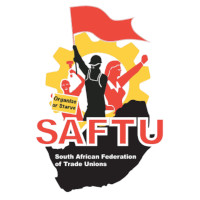South African Federation of Trade Unions – SAFTU
XENOPHOBIA AND LABOUR MIGRATION
South Africa has a rich, long history of labour migration. Historically, gold mining drove mass amounts of labour migration in South Africa and more recently, such migration has often been driven by people fleeing economic hardships in their countries and the opportunities that South Africa is thought to provide.
Since the new dispensation in South Africa, with a world leading constitution and their rights enshrined therein, the Bill of Rights extends to both asylum-seekers and refugees. The 1998 Refugees Act gives both asylum-seekers and refugees the right to work, while their status is being determined. Moreover, freedom of movement is generally allowed, access to healthcare and education, and the right to apply for permanent residence after five years. Additionally, South Africa bucks the general trend of many other African nations and instead opted for local integration and avoided encampments. In many ways, South Africa maintains and even exceeds international refugee protections standards.
Yet the living reality for many migrants is very different. South Africa’s asylum application system is overburdened, and this has worsened post-pandemic. Key challenges remain of government resource and staff constraints, corruption, amendments to the Refugee Act, and a set of backlogs, prevention of access and documentation, arrest and deportation, and worsening protection. Indeed, not only is there a “paper wall” for immigrants to South Africa but also a real and present everyday danger in being a foreigner.
The rise of prejudice towards foreigners in South Africa—or xenophobia—has again become a real danger to all migrants. The deadly xenophobic attacks of 2008 have a resurgence in the present day. Reports show that during 2020, events of violence and discrimination against non-national persons in South Africa continued and worsened. Many of these attacks are reported not only to be committed by ordinary black working class people but, indeed, from government and law enforcement officials. During the Covid-19 lockdowns, Human Rights Watch reported that South Africa’s aid programmes overlooked persons with disabilities; lesbian, gay, bisexual, and transgendered (LGBT); and refugees and asylum-seekers. Despite the 2019 National Action Plan that sought to combat xenophobia, racism and discrimination, the South African government has also begun to limit the rights of refugees and asylum-seekers through legislation, such as the drafted National Labour Migration Policy from the Department of Employment and Labour.
Date: 30 September 2022
Mode: Hybrid (in-person and webinar)
Venue: ANEW Hotel Parktonian Johannesburg (120 De Korte St, Braamfontein, JHB, 2000)
Time: 09h00 (08h30 Zoom join) – 14h00
Zoom link: https://us02web.zoom.us/j/89219645991?pwd=bzVqWS9pbFlaSkVmemNObzF4SGUxdz09
Meeting ID: 892 1964 5991
Passcode: 236746






